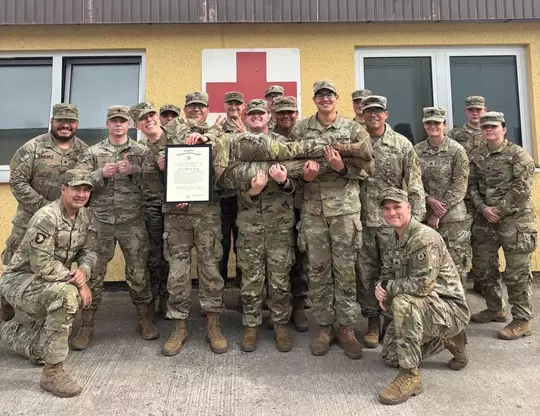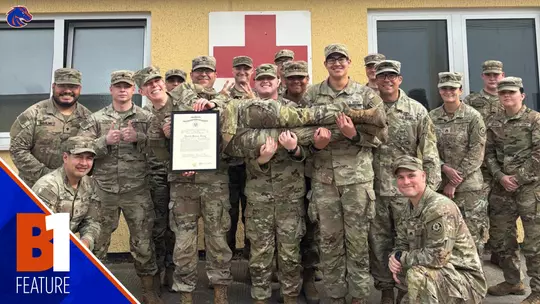
Serving on Every Front
From tennis courts to Army corps
Isabella Williams
When Corey Patton Lossner looks back on her time at Boise State, most of what shaped her comes down to two things: tennis and the military.
Growing up in Colorado Springs, Colo., tennis was more than a hobby. It ran all throughout the family and shaped her as a player.
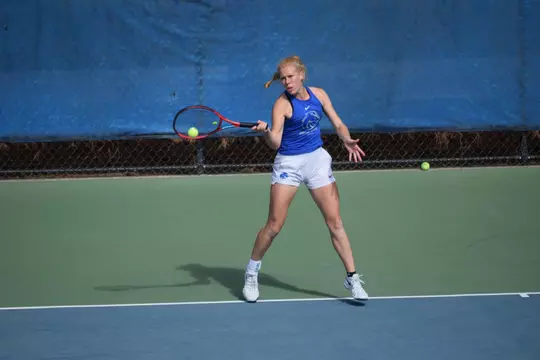
“My mom would always take me to the courts while growing up — it was always around me,” Corey said. “I started playing when I was about five, and it just became what I knew.”
Her mom played at UC Irvine and even competed in World Team Tennis, while her stepdad became her first coach when she was five.
Aside from Corey’s parents, her uncle, Greg Patton, built one of the most successful coaching careers in Boise State history.
Patton is widely recognized for transforming Boise State into a national tennis powerhouse following his arrival in 1993. In his first season at the helm, he guided the Broncos to their first conference championship since 1974. His success continued as Boise State captured four straight Big Sky titles (1993-96) and went on to win the Big West Championship in its inaugural season in the league (1997). That same year, the Broncos climbed as high as No. 2 in the national rankings and advanced to the NCAA Championship quarterfinals, finishing fifth overall.
While successfully leading the Bronco program, Patton captured numerous individual honors, including induction into four different halls of fame: the UC Irvine Athletic Hall of Fame (2000), the Boise State University Athletic Hall of Fame (2001), the Idaho Tennis Association Hall of Fame (2013), and the USTA Intermountain Region Hall of Fame (2015). He was named NCAA National Coach of the Year (1997), USPTA College Tennis Coach of the Year (2013), Intercollegiate Tennis Association Region Coach of the Year five times (1994, 1997, 2004, 2012, 2014), and conference coach of the year 10 times across four leagues: Mountain West (2012), Western Athletic Conference (2005-07, 2009), Big West (1997), and Big Sky (1993-96). In addition, he received the USTA Intermountain Tennis Association Lifetime Achievement Award (2013), the Keys to the City of Boise (2013), and the USTA/NCAA National Community Service Award twice (1997 and 2003).
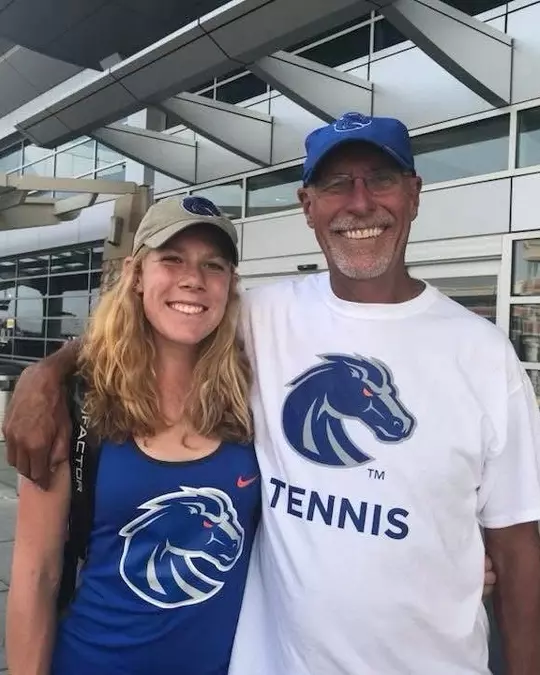
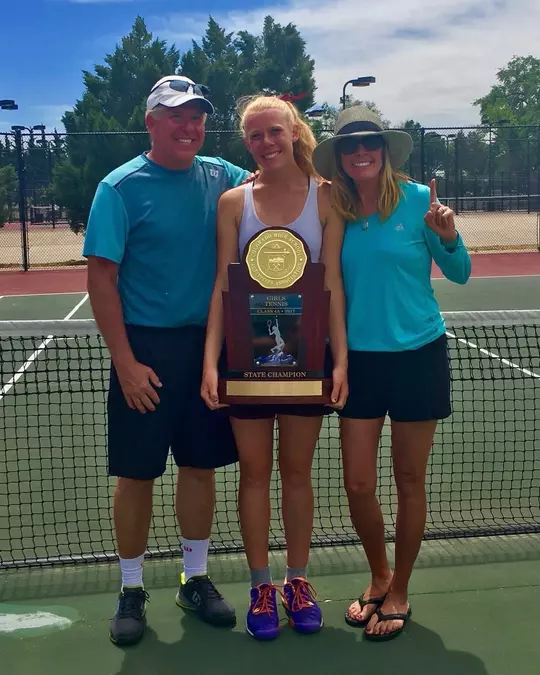
Greg’s influence on her while growing up went far beyond drills and footwork. Corey says that aside from tennis, he’s always been known for his sayings, his energy, and his outlook on life.
You’ve got to have gratitude in your attitude to get altitude.Greg Patton
“It’s very true,” Corey said. “I think in my family especially, but also in the sport of tennis, it's so important to have gratitude for where you came from, for the experience you're having right now, and the future of what may come of it.”
When Corey joined the Broncos in 2018, she knew her family name would follow her, but she certainly didn’t live in anyone’s shadow.
She made an early impact as a freshman, competing in both singles and doubles in her first year as a Bronco, and emerging as a leader on the team.
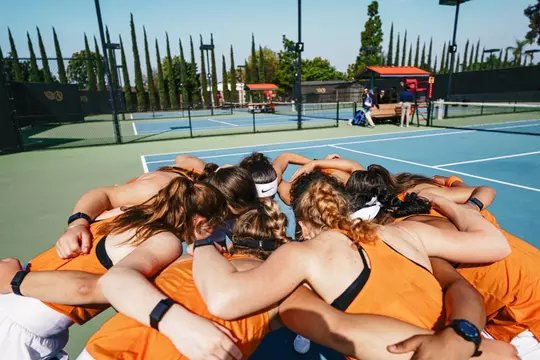
Even as a strong player, what stood out even more than her results was her attitude. Coaches and teammates noticed how steady and supportive she was, no matter the match or moment.
“Tennis taught me that the game’s not over until the very last point,” she said.
You can be down and still come back…You can fail one day and still show up the next.Corey Patton Lossner
That mentality carried her through every season.
By her senior year, she earned her ITA Scholar-Athlete and Mountain West Scholar-Athlete honors, recognition for her ability to excel both on the court and in the classroom.
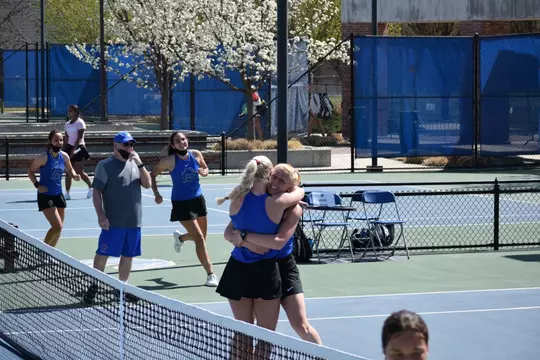
Her approach to tennis reflected her larger philosophy in life: steady effort, persistence, and care for the people around her.
Balancing the Court and the Cadet Life
While most student-athletes already juggle classes, workouts, and matches, Corey added Army Reserve Officers’ Training Corps (ROTC) on top of that.
The Reserve Officers’ Training Corps, better known as ROTC, is a college-based program that prepares students to become officers in the U.S. military after graduation. Students participate in field training exercises, leadership labs, and physical fitness tests, all designed to develop decision-making skills and resilience.
For Corey, it meant learning how to lead others while still being a student-athlete, a challenge that pushed her far beyond the tennis court.
It wasn’t easy, and she often had to figure out how to manage multiple demanding schedules at once.
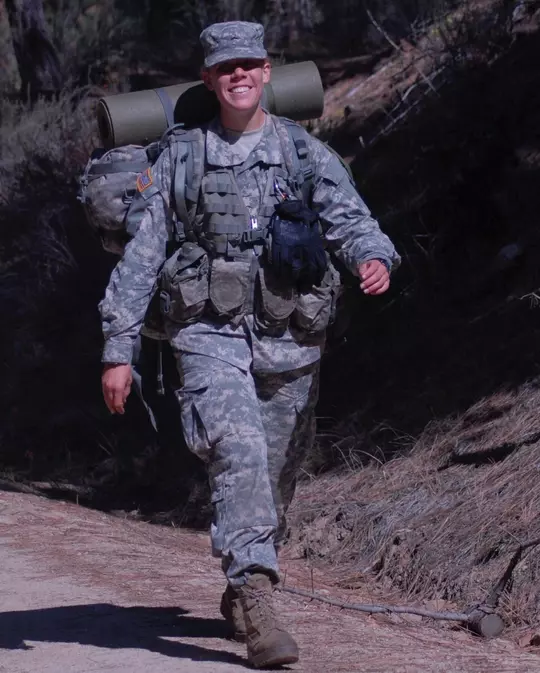
Her interest first started while exploring what she wanted to do after high school. Originally, Corey considered joining the Peace Corps as a way to travel, help others, and gain a broader view of the world. But when she learned she couldn’t apply until after college, she began looking for other ways to challenge herself and serve a bigger purpose.
Her search eventually led her to Boise State, where she joined the Army ROTC program while continuing her tennis career. Balancing the two was unlike anything she’d done before.
“I was the only person at Boise State going through my specific experience,” she said. “It was definitely a learning curve.”
Her days were long. She would usually wake up before sunrise for Army physical training, head to tennis practice, attend classes, and sometimes participate in ROTC labs or leadership exercises.
“There would be days where I’d do physical fitness with the Army from 6 to 7:30 a.m.,” she said. “Then I’d go lift with the team, practice for three hours, then go to class — it was a lot, but I loved all sides of it.”
Balancing both wasn’t easy, but Corey said she was grateful for the support she received from her coaches and ROTC leaders.
“People were really understanding,” she said. “They saw how much I cared about both, and they were always willing to adjust when I needed a little flexibility,” she said.
That kind of encouragement made all the difference.
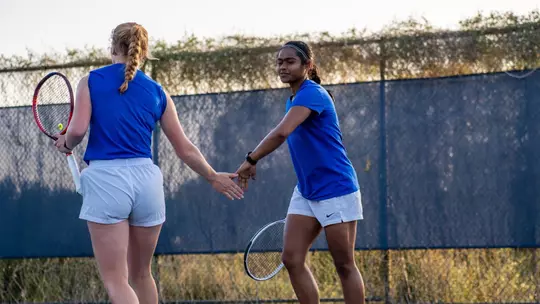
Balancing the two worlds also taught her how to adapt and stay grounded. She realized that discipline, focus, and empathy weren’t just skills, but habits that could carry her through any challenge.
Stepping into Service
After finishing her Division I tennis career at Boise State in 2022, Corey was commissioned into the U.S. Army through the ROTC program.
“When I finally commissioned, it kind of hit me all at once,” she said. “I’d just finished my senior season, and everything I’d been working toward for years was happening back to back.”
She was selected for the Medical Service Corps, her first choice branch, and soon found out she would be stationed in Germany.
“Honestly, I cried when I found out,” she said. “I had already known I got my first choice of duty location too, which is Germany. That was really special.”
Moving overseas was both exciting and nerve-wracking. From navigating cultural differences to adapting to life on a military base, she quickly learned to rely on the same adaptability and mental toughness that carried her through her college tennis career.
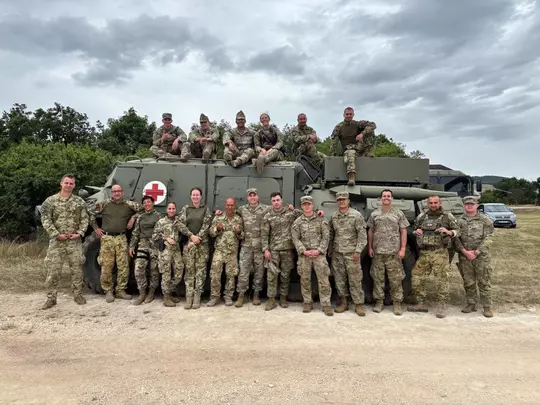
Corey currently serves as a medical platoon leader, overseeing about 40 medics, also known as 68 Whiskeys. The nickname comes from the military occupational specialty (MOS) code “68W,” a term used across the Army to identify trained medical personnel.
Her role spans everything from planning training sessions to leading field exercises, ensuring her team is prepared for any situation.
“Being physically fit and able to make decisions under pressure is a huge part of what we do every single day,” she said. “Going through the toughest conditioning sessions or the hardest matches has directly translated to what we do in the Army.”
Corey’s experience on the team provided an early foundation in leadership, and the lessons she learned on the court continue to shape how she leads today.
I’ve had to learn that leadership looks different for everyone. It’s not just about giving orders — it’s about knowing your people and figuring out how to bring out the best in them.Corey Patton Lossner
She emphasized that leadership isn’t just about orders or titles, but about listening, observing, and encouraging others to rise to the occasion.
From a life surrounded by tennis to leading medics overseas, Corey’s path has come full circle. Each stage prepared her for the next, giving her skills, confidence, and perspective that guide her today.
Tennis taught her how to push herself, ROTC taught her how to lead others, and both taught her how to serve.
